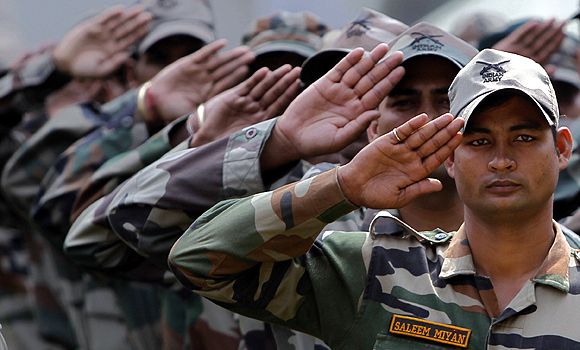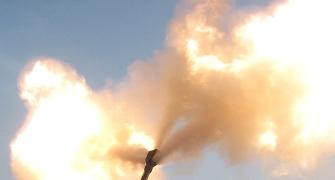 Full liberalisation of the defence industry is necessary for both combat-readiness and security of long-term supplies, says Nitin Pai.
Full liberalisation of the defence industry is necessary for both combat-readiness and security of long-term supplies, says Nitin Pai.
Who cares where the guns our soldiers use are produced? Who cares which company manufactures the planes our air force uses? Who is concerned about who are the shareholders of the companies that make our ships and submarines?
Not the citizen. All he cares for is whether our armed forces defeat our enemies.
Not the taxpayer. All she cares for is whether our troops get the best equipment possible to win wars.
Not the soldier, who only wants to have the best gun, the best personal safety and the best living conditions.
Not the generals, admirals and air marshals. They want the appropriate equipment, reliable supplies and spares that give them the confidence to plan and execute their military strategies.
So who cares? Members of the defence establishment do. They are concerned about who and where the defence equipment is procured from. Many care for genuine reasons: they believe India’s defence is best guaranteed when most the important weapons systems are produced indigenously, as foreign suppliers can be unreliable, perfidious or risky for a whole range of reasons.
Sometimes foreign suppliers won’t sell us what we need -- especially high-technology equipment and components that have a strategic nature. So self-sufficiency and indigenisation, through domestic R&D and “technology transfers” from abroad are important.
Who else cares? There are a range of beneficiaries from the status quo who would like the status quo to persist -- these range from foreign suppliers who have a lock on the Indian market to their agents, from private domestic manufacturers to sections of the defence public sector units. They fear that their customers will no longer remain captive, and their profit margins and livelihoods will be adversely affected. These are genuine fears.
The role of the government in a democracy is to arbitrate competing interests choose the best option. The question of whether or not the defence production sector should be liberalised to allow domestic and foreign investors to enter the market can be answered simply by asking “whose interests should take priority?” Neither the armed forces who use the equipment nor the citizens who pay for it are overly concerned about shareholding patterns and management control of the companies that produce it.
Unless someone argues that the primary purpose of our defence policy is to ensure the livelihoods of current foreign and domestic suppliers, then it is clear that there is a case to liberalise the sector to all investors -- public, private, foreign and domestic. For defence as for other industries, who owns the company is less important (external link) than what incentives the company faces.
What about the concerns of the strategic establishment? It is necessary to persuade the well-meaning leaders, civil servants, scholars and analysts that liberalising the industry is, in fact, the best way to achieve the ends they seek.
The combat-readiness argument is easily made. It’s obvious that equipping our armed forces with the best available equipment will help them carry out their jobs well, here and now. The long-term supply argument is non-intuitive and hence, deserves more persuasion.
Let’s our automobile industry as an example -- because it comes close to the nature of the defence production industry. India started producing good cars after two decades of the liberalisation of the automobile industry, a feat the country couldn’t manage in the three decades when the industry was closed to foreign investment. Mahindra, Tata and Maruti produce good cars today because Hyundai, Ford and Nissan can make cars in India. We also have a globally competitive automotive components industry. The secret here is that “technology transfer” happens through the osmosis of people and ideas, not the purchase of blueprints.
It was not by limiting foreign investment that China today has acquired the capabilities to produce everything from high-speed trains, to aircraft to network equipment. It was by courting foreign manufacturers, and creating opportunities for thousands of Chinese engineers, technicians, managers and entrepreneurs to acquire knowledge and skills that they could then use to create the base for new domestic manufacturers.
So those who care about acquiring self-sufficiency in defence production and building a competitive indigenous defence industry must welcome liberalisation and foreign investment. If self-sufficiency is seen as a policy goal, it can be achieved. If it is seen as a dogma, it will remain elusive.
Now let’s ask if raising the FDI cap from 26 per cent to 49 pc -- as the NDA government announced in its maiden budget on July 10 -- will help us achieve combat-readiness and self-sufficiency. The prospect of making higher dividends from the lucrative Indian arms market is likely to raise the interest of more foreign manufacturers. Yet, because the change neither opens the doors fully nor comes with the comfort of management control, it is not clear if it will be attractive enough to the kind of foreign manufacturers that we really need. Why so? Because, as long as India continues to buy equipment directly from foreign manufacturers, they will have less of an incentive to set up local subsidiaries where they only have a 49 pc share.
In other words, the jump from 26 pc to 49 pc is in the right direction but not far enough. The only way to achieve the benefits of FDI is to remove the cap entirely, with the government retaining the right to disallow players it considers undesirable.
To be sure, given the stiff opposition to the move in powerful and influential quarters, the fact that the NDA government has manage to raise the cap at all is no mean feat. It should continue on this path and get to 100 pc FDI in defence production in the near future. In doing so, it will be acting in the interests of both citizens and the troops who defend them.
Nitin Pai is director of the Takshashila Institution, an independent, non-partisan think tank.







